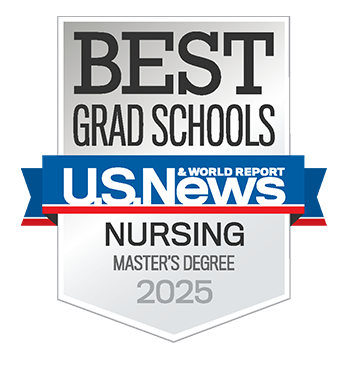FALL 2026 – Master of Science in Nursing (MSN): Entry into Nursing Program
Need your questions answered?
OVERVIEW
Make Your Next Move. Become a Nurse.
If you’ve earned a bachelor’s degree in another field and are ready for your next move, the Entry into Nursing program at the Johns Hopkins School of Nursing offers a powerful path forward.
This full-time campus-based graduate program isn’t just about becoming a nurse; it’s about becoming a leader. Our students grow into researchers, advocates, problem-solvers, and innovators through purposeful learning and experience. Whether at the bedside, in the boardroom, within communities, or at the policy table, our students are reshaping how health care responds to the urgent, interconnected needs of individuals, communities, and the planet.
Are you ready to become the kind of nurse who will lead, influence, and provide care in a rapidly changing world?
A Program Designed for Impact
At Johns Hopkins, nursing education is anything but traditional. Our program is:
- Built for purpose – We welcome bold, curious learners who want to advance health equity, reimagine care systems, and improve lives.
- Rooted in innovation – Learning happens through experiential, immersive clinical experiences, state-of-the-art simulation, and community-based practice.
- Guided by systems thinking – We prepare nurses to understand how social, economic, environmental, and policy forces shape health—and to lead across those systems.
- Driven by real-world readiness – Our competency-based approach means you’ll be ready to improve health outcomes in diverse healthcare settings
Program Details
Tuition & Fees
Estimated Tuition Cost: $28,000 per semester for tuition*. Additionally, the cost of the program includes living expenses, course materials, transportation and minimal fees. See Details
Financial Aid: There are numerous options for financing your education including grants, scholarships, federal loans, and employment programs. Learn more.
*Pending JHU Board of Trustee approval
Upcoming Application Deadlines
Fall entry: Nov 1, Jan 15
Spring entry: Jul 1, Oct 1
“We’re trying to prepare practice-ready nurses for as many diverse nursing roles as possible.”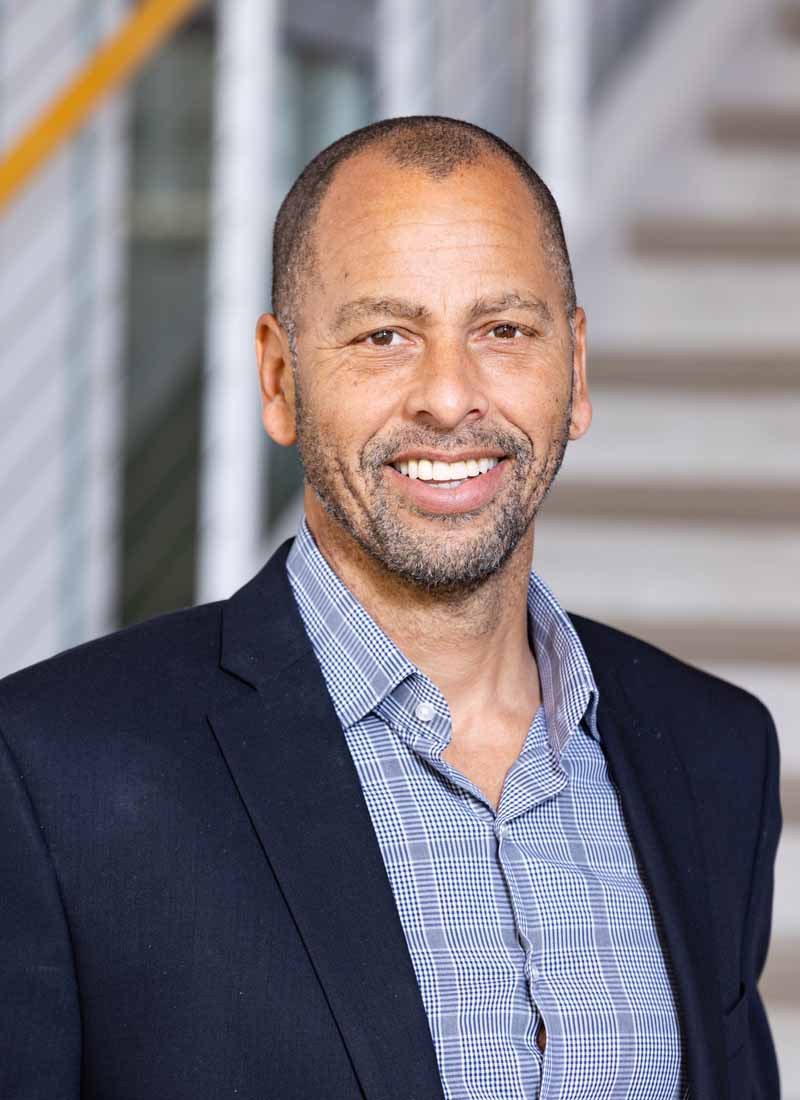 Robert Atkins, PhD, RN, FAAN
Robert Atkins, PhD, RN, FAAN
Learn. Integrate. Lead.
The curriculum is designed to build your competence over time, increasing in complexity as you progress. Through integrated assessments across clinical, classroom, and simulated settings, you’ll learn to apply knowledge, skills, and behaviors in meaningful ways—always with a focus on what people, populations, and the planet truly need to thrive.
You’ll graduate not only prepared for practice, but also for what’s next—whether that’s leadership, advanced practice, or doctoral study.
Nursing Starts Here
Your background doesn’t have to be in health care. What matters is your commitment to making a difference. If you’re ready to reimagine your future—and help shape a more just, resilient, and responsive health system—this is where it starts.
INside, OUTside
The future of nursing is IN homes and schools, OUTpatient settings and INpatient acute care. At the Johns Hopkins School of Nursing, we’re empowering nurses to meet patients where they are, advance health equity across settings, and champion the shift toward whole-person, community-based care.
Inside the Outside Track
Students in this track are the first in the nation to become nurses through clinicals that take place entirely outside of the hospital setting. A small number of students interested in community health gain hands-on experience in outpatient settings like community-based health centers, senior living facilities, and work one on one with preceptors to provide access to primary and preventive care.. This approach prepares students for diverse roles outside of hospital settings. Community partners value these graduates, who are ready for outpatient roles prioritizing holistic, patient-centered care.
Requirements
Admission Criteria
Bachelor’s Degree (in a discipline other than nursing) from a regionally accredited college or university or an equivalent degree from a comparable foreign institution
Cumulative GPA of at least 3.0 on a 4.0 scale from all previously attended accredited colleges/universities
3 Letters of Recommendation (2 academic and 1 professional)*
Official Transcripts (from all previous colleges/universities)
GRE scores are accepted but not required
One written essay
Virtual Interview/Video Essay
Current Resume
Information for applicants with international education
*References should be recent, written for the purpose of your application to this program and from professors who know you as a student or employers who know you as a professional in a job setting preferably in a supervisory role. Personal references from colleagues, friends, or family members do not meet the requirement.
Prerequisites
In addition to a bachelor’s degree in a non-nursing field, applicants must complete 17-21 credits (grade B- or better) of prerequisite coursework from a regionally accredited college or university.. Students who have not taken their prerequisites can take them all online at Hopkins Nursing.
Applicants can be working on prerequisite coursework while applying to the program. Coursework must be completed and final transcripts submitted prior to starting the Master’s Entry program.
Anatomy with lab OR Anatomy and Physiology I with lab1 (3-4 credits)
Human Growth and Development Through the Lifespan2 (3 credits)
Microbiology with lab (3-4 credits)
Nutrition (2-3 credits)
Physiology with lab OR Anatomy and Physiology II with lab1 (3-4 credits)
Statistics3 (3 credits)
1 Anatomy with Lab must be taken with Physiology with Lab to meet the requirement OR Anatomy and Physiology I with Lab must be taken with Anatomy and Physiology II with lab to meet the requirement. Course formats cannot be mixed or content will be missed (i.e., A&PI with lab cannot be combined with Anatomy with lab to meet the prerequisite requirements).
2 Course content must cover the full lifespan—from conception (birth) to death—in order to meet the requirement.
3 Topics should include correlation and linear regression; experimental design such as t-tests, analysis of variance and chi-square; suggested departments: psychology, sociology, education, biology, and mathematics. Statistics courses offered by business, management, and economics departments are typically more theory-based and lack the experimental design component.
U.S. immigration regulations require that students needing an F-1 visa must successfully fulfill all prerequisites before an I-20 can be issued. To allow sufficient time to complete all the steps in the visa process, students must submit an official transcript or official course by course evaluation with final grades (B- or higher) for all prerequisite courses to the Office of Admissions at least 3 months prior to the beginning of the term in which they wish to begin studies (October for spring term; May for fall term).
MSN Entry profile based on Fall 23 cohort
30%
Underrepresented Minority
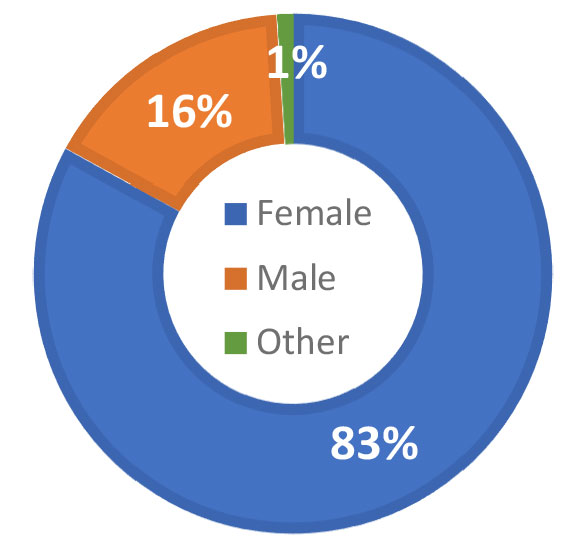
83% Female/16% Male/1% Other
29%
First Generation
20
Countries Represented
29
States Represented
25
Average Age
90%
Received Scholarship Support
Curriculum
starting Fall 2026
- Core 1: Introduction to Professional Nursing Practice (2)
- Introduction to Pathophysiology (2)
- Pharmacology I (2)
- Mental Health and Communication in Nursing Practice (2)
- Mental Health and Communication in Nursing Practice Clinical (1.5)
- Principles of Nursing Practice (3)
- Principles of Nursing Practice Clinical (0.5)
- Core 2: Developing Nursing Practice (2)
- Biostatistics for Nursing Inquiry (2)
- Pharmacology II (2)
- Perspectives on Aging (1)
- Adult Nursing Care: Chronic Health Management (2)
- Adult Nursing Care: Chronic Health Management Clinical (1.5)
- Public Health Nursing (2)
- Public Health Nursing Clinical (0.5)
- Core 3: Nursing Across Contexts (1.5)
- Policy and Systems Change in Nursing (2)
- Adult Nursing Care: Complex Health Management (2.5)
- Adult Nursing Care: Complex Health Management Clinical (1.5)
- Pediatric Nursing Care (2)
- Pediatric Nursing Care Clinical (0.5)
- Perinatal Nursing Care (2)
- Perinatal Nursing Care Clinical (0.5)
- Transition to Professional Nursing Practice (3)
- Nursing Specialty Elective (3)
- Preparation for RN Licensure (1.5)
- Leadership for Role Identity (2)
- Synthesis of Nursing Practice Clinical (2.5)
* Transfer Credits from the JHSON MSN (Entry into Nursing) Program to the DNP Advanced Practice Track can vary based on current curriculum & start date.
“My personal ambition of doing more than what is expected leads me to pursue a program that encourages its future nurses to challenge themselves in providing the highest quality of care on a global level.”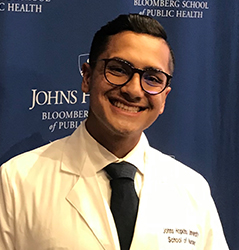 Kash Calderon
Kash Calderon
Engage with Us
Join us soon for a tour, on-campus event or a virtual visit.
Request Information
Speak with Admissions to learn more about our programs.
Virtual Info Sessions
See recordings of some of our recent virtual info sessions.
Tuition & Other Costs
Financial aid
Students in the four-semester MSN Entry into Nursing program will pay $28,000 per semester for tuition*. This amount will remain the same for all four semesters. Tuition will not increase in the second year.
Additionally, the cost of the program includes living expenses, course materials, transportation and minimal fees. These have risen recently by 1-3% annually. Current year costs can be viewed below to help estimate costs for a fall 2026 start. Final tuition and cost of attendance for fall 2026 is expected to be available in late spring.
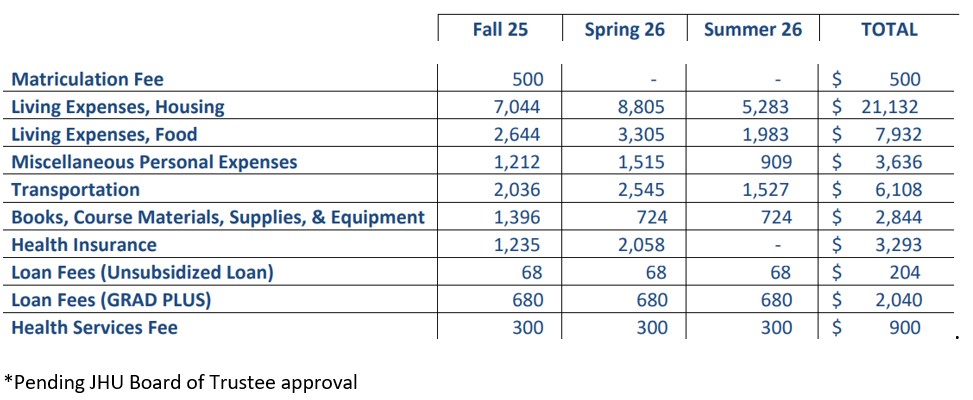
Scholarships: The School of Nursing sets aside funds for students who demonstrate strong academic ability, leadership skills, outstanding community service, and other personal strengths and accomplishments. These merit and need-based awards are granted for outstanding achievement and leadership potential. Each student is considered upon applying for admission. Scholarships range from $5,000 to full tuition. Learn more.
Loans: Many students will avail themselves of loans to help finance their School of Nursing education. If necessary, we encourage you to borrow only what is absolutely essential to cover your educational costs. Learn more.
Employment: Many students locate part-time employment to help pay education expenses. Numerous positions are available on campus and within various community based organizations. These jobs provide students with opportunities to gain practical work experience. Most positions are funded through the Federal Work-Study Program. Learn more.
Frequently Asked Questions
Student and Program FAQs
No. This program incorporates elements of flexibility common in competency-based education, but learners progress together following a set schedule.
No. This program is accelerated and requires a full time, on-site commitment.
CBE is a key strategy to ensure graduates are practice ready. The American Association of Colleges of Nursing describes CBE as an integrated approach to instruction, assessment, feedback, self-reflection. It is based on the learner’s ability to demonstrate competencies which reflect knowledge, attitudes, motivations, self-perceptions and skills. The competencies, and how to demonstrate them, are transparent for students and faculty so they can work together to ensure success. Hallmarks of CBE include access to formative (practice) assessments before completing summative (final) assessments and individualized coaching to ensure success
Yes. Our exams are designed to assess how well you can apply knowledge—not just how well you can recall facts. They also help prepare you for the NCLEX-RN, which is required for licensure after graduation.
We don’t just teach nursing—we make sure you’re ready to practice it. Our integrated assessments ensure you demonstrate what you’re learning across the curriculum in the clinical setting.
Experiential learning is an active, cyclical learning process that includes experiencing, reflecting, thinking and acting. In the MSN Entry to Nursing program, this means that learners are actively engaged in both building competencies and learning how they learn. Together, this ensures graduates are prepared for entry to practice and the lifelong learning that nursing requires.
The Johns Hopkins University is committed to Planetary Health, a “solutions-oriented, transdisciplinary field and social movement focused on analyzing and addressing the impacts of human disruptions to Earth’s natural systems on human health and all life on Earth”. Nurses’ critical role in planetary health is highlighted by the International Council of Nurses and the American Nurses Association Code of Ethics. Our curriculum reflects the Planetary Health Education Framework which addresses the following domains: interconnection with nature, the Anthropocene and health, equity and social justice, movement building and systems change, and systems thinking and complexity.
Most of the non-clinical courses are delivered in person within the School of Nursing building. Some of these courses may use a traditional lecture format, while others may use a flipped classroom approach. In a flipped classroom, learners interact with the content prior to class so that class time can be used to practice applying the content to real-world nursing scenarios.
Clinical courses are held in off-site clinical sites and in our state-of-the-art simulation learning center
All MSN Entry into Nursing students must successfully complete all semester work with a C+ or better to move to the next semester’s courses. If a student fails a course (C grade and below) or withdraws from a course, the course must be completed successfully before continuing in the curriculum.
Current clinical sites include locations in Baltimore city and within a 60-mile radius from the school.
You will be assigned a clinical placement for your first clinical course. You may be able to provide input on preferred sites in subsequent semesters; however, we cannot guarantee preferred site placement.
All students are responsible for their own transportation to and from their assigned clinical sites. Some clinical sites are not served by public transportation and are located within a 60-mile radius of the school.
Program Outcomes FAQ
Many leadership and teaching roles within healthcare require at least a master’s degree in nursing in addition to an RN license. The masters-level education gained from this program will enable you to access these expanded nursing roles more quickly compared to earning a baccalaureate degree. You will also be academically prepared to pursue an advanced nursing degree (e.g., NP, DNP, CRNA) or nursing research degree (PhD).
Students become eligible to take the NCLEX after they complete their selected program in its entirety.
The JHSON offers two doctoral programs for those interested in continuing their nursing education.
• The Doctor of Philosophy (PhD) program prepares nurse scholars to develop and conduct scientific research that advances nursing practice, healthcare, and health. The PhD Program will accept up to 15 credits to be transferred into the PhD program directly from the JHSON MSN Entry into Nursing program.
• The Doctor of Nursing Practice (DNP) program prepares nurses at the highest level of professional nursing practice for advanced roles as clinical and healthcare policy leaders. The DNP Program will accept up to three courses to be transferred into the DNP Advanced Practice Track directly from the JHSON MSN Entry into Nursing program.
With your MSN degree in hand, you will be able to sit for the NCLEX. Once you obtain your RN licensure, you can continue your studies in advanced nursing practice or begin employment as a RN.
Application and Financial Aid FAQs
Yes! The school has several financial assistance programs that may include scholarships, grants, work-study, and loans.
GRE scores are accepted but not required for the MSN (Entry into Nursing) Program.
No. Prerequisites do not need to be completed by the time you apply but must be completed by the time the program starts.
The Admissions Committee can accept an applicant who still has courses pending on the condition that they complete all pending courses with a B- or better.
U.S. immigration regulations require that students needing an F-1 visa must successfully fulfill all prerequisites before an I-20 can be issued. To allow sufficient time to complete all the steps in the visa process, students must submit an official transcript or official course by course evaluation with final grades (B- or higher) for all prerequisite courses to the Office of Admissions at least 3 months prior to the beginning of the term in which they wish to begin studies (October for spring term; May for fall term).
We recommend but do not require that prerequisites be completed within the last five years.
Similar to an in-person interview, you’ll be asked 3 questions, one from each of three main themes: Motivation, Teamwork, and Cultural Humility. You’ll have 60 seconds of prep time after being asked the question, and 90 seconds to respond.
You must complete the video interview in one sitting on a day and at a time convenient to you. It will take about 20 minutes to complete.
We appreciate and value your natural, authentic, honest responses. Feel free to check out our Admissions Workshops webpage for additional tips for submitting your application.
